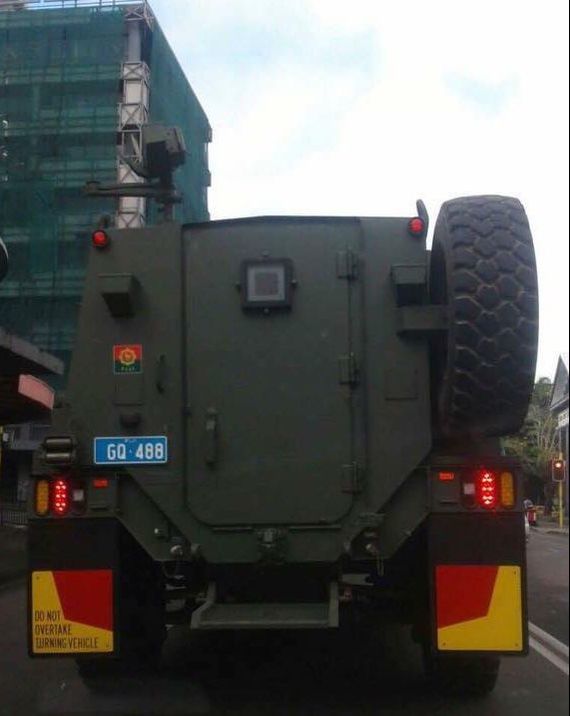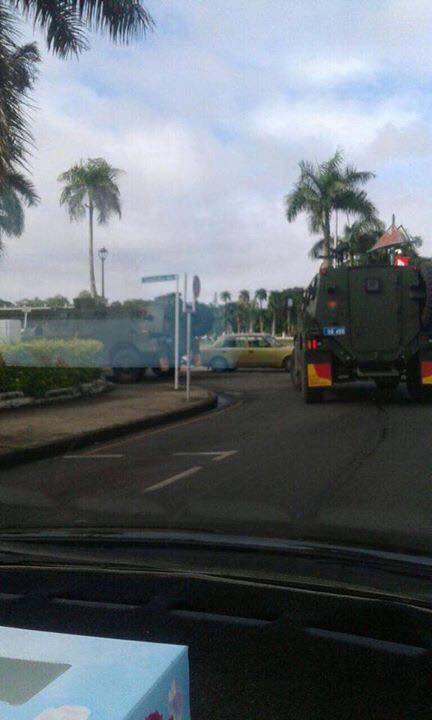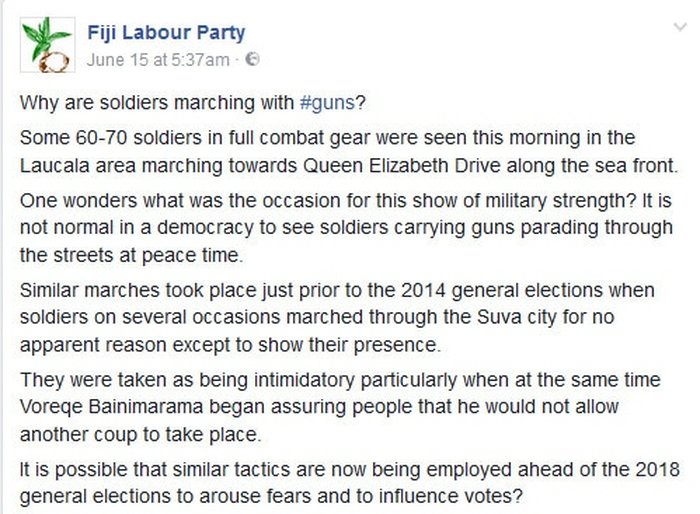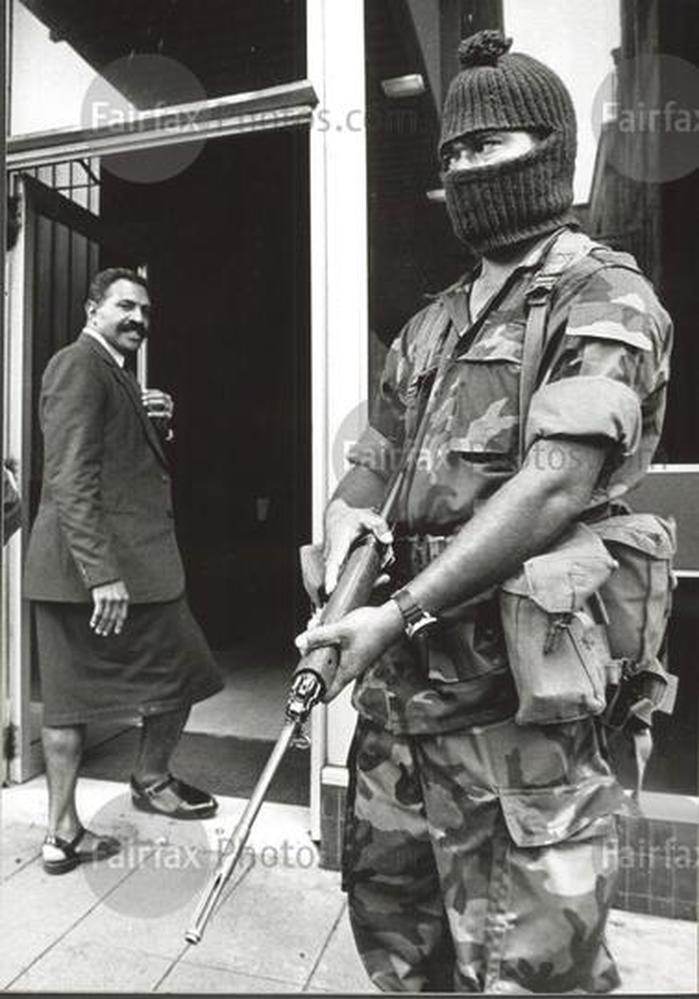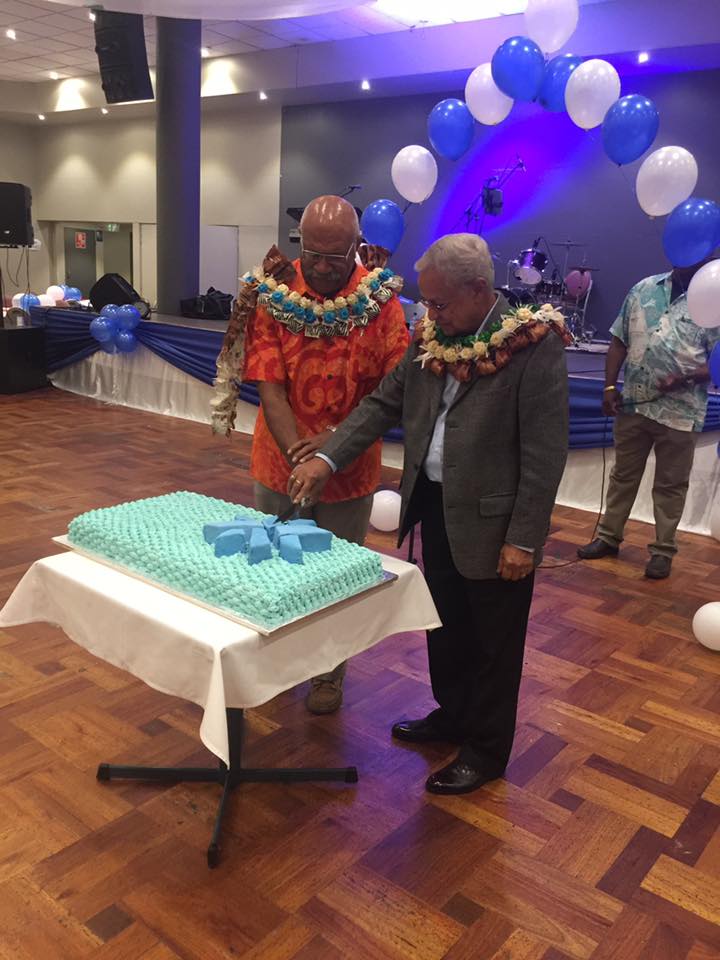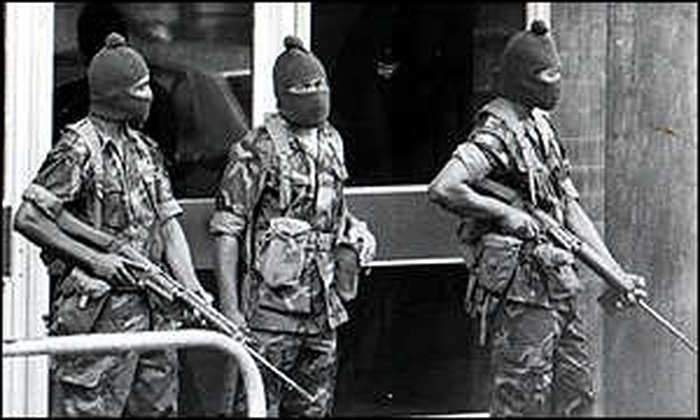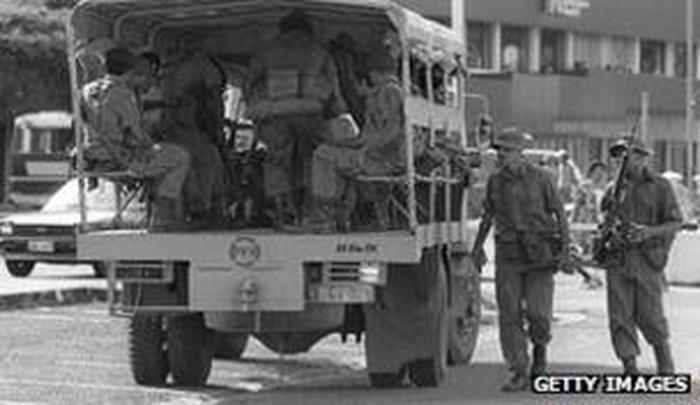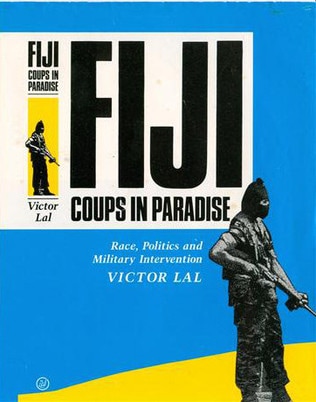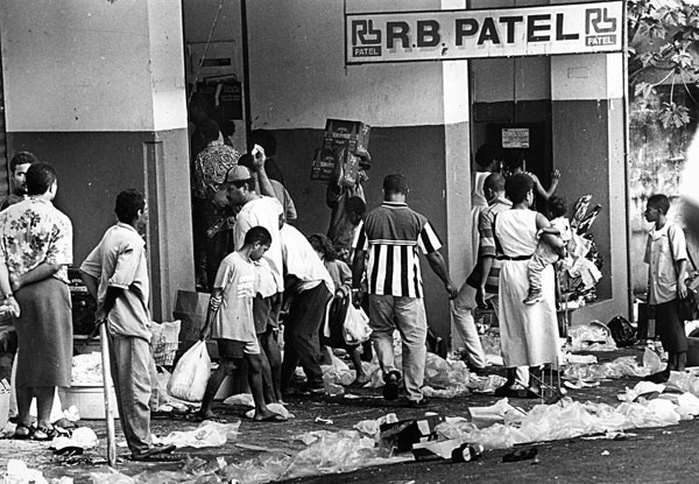| From The Fiji Times, 26 June 2017 THE people of Fiji should not fear if they see the Bushmaster — an armoured infantry mobility vehicle — used by the Republic of Fiji Military Forces (RFMF) on the road. RFMF chief of staff Colonel Jone Kalouniwai yesterday clarified the three Bushmasters that the military purchased from the Australian Government were not offensive weapons. Col Kalouniwai's explanation followed comments made by National Federation Party (NFP) leader Professor Biman Prasad that the military should stop intimidating the people by operating the Bushmasters on the streets. Last Friday, social media went viral, clearly showing a Bushmaster being driven on Victoria Parade in Suva, gathering mixed reactions from members of the public. Prof Prasad said pictures showed the Armoured Personnel Carrier (APC) near the Fiji National Provident Fund Plaza, commonly known as Dolphins and the Suva City Council Library. He said Defence Minister Ratu Inoke Kubuabola had told Parliament in a ministerial statement that 10 Bushmasters had been purchased from Australia. "Seven were to be deployed in Golan Heights for our peacekeepers and three were being retained in Fiji to be used for training by the military personnel," Prof Prasad said. The NFP leader said any training using the Bushmasters should be confined within military establishments. "They should be strictly used for training by those selected for peacekeeping duties, not by regular forces and driven through the streets. "This is precisely what happened last Friday when a Bushmaster with registration number GQ 488 was being operated in the city." He said the operation raised serious questions on the neutrality of the armed forces. "We clearly saw the military marching in most parts of the country 48 hours before the September 17, 2014 General Election under the pretext of training. |
"We raised our concern with the Electoral Commission but our concerns were not addressed.
"Now the military is indulging in the same tactics at least a year away from the election. This must be condemned in the strongest manner."
He said the military should not overstep its role despite its constitutional responsibility.
"Operating an Armoured Personnel Carrier in civilian areas when there is absolute peace and stability and no emergency is not guaranteeing peace and security but instilling fear and uncertainty in our people.
"It is sending a wrong signal. The military must understand that it is subservient to civilian rule.
"We ask, are the three Bushmasters for training or going to be operated in our towns, cities and densely populated areas to show force and intimidate our people?"
He said Fiji was not a war zone and peacekeeping training does not involve using Bushmasters in the full view of civilians and visitors to our country.
Col Kalouniwai said the soldiers were using the Bushmasters on the streets last Friday as it was Infantry Day.
"There is no law that prohibits Bushmasters using the roads in Fiji. There is nothing wrong with that," he said.
Colonel Kalouniwai said the Bushmaster was a protected mobility vehicle used to carry troops - that's all.
"They're not an offensive weapon. There is nothing for them (public) to fear.
"We all know the political hype they (NFP) have and they're just trying to make an issue out of this.
"We were just celebrating Infantry Day and the guys (soldiers) thought it would be a good thing for them to take it out, that's all."
He said the fact remained that the vehicles were bought to be used for peacekeeping and pivotal training and there are only three of them used for training purposes.
"There is no harm in us putting it out on the streets and just driving it around."
Col Kalouniwai said Prof Prasad had wrong idea and wrong perception and should try and get more facts from his party's president, Pio Tikoduadua, on what the Bushmaster really is.
| SUVA, Fiji, May 20, 1987 — Mobs of several thousand indigenous Fijians attacked ethnic Indians throughout the capital today, wounding scores in the worst outbreak of ethnic violence this Pacific island group has ever seen. Waves of Fijians ran down the main street of Suva, hurling rocks through windows of passing cars and beating up Indians they encountered. The number of injured was estimated at 150 to 200, including three dozen Indians and two foreign journalists who were hospitalized. ''We haven't ever had scenes like that before in the history of our country,'' said the Agriculture Minister, Jo Nacola. The rioting appeared to reflect support for the army coup last Thursday, which seems to be falling apart. It also reflects the confused situation in Fiji: perhaps there is no government in control, perhaps there are three governments, but there is certainly not just one. Fiji, with almost evenly balanced proportions of ethnic Fijians (47 percent) and ethnic Indians (49 percent) among its 715,000 people, has often been acclaimed as a model of racial harmony. Pope John Paul II said on a visit here late last year that the lack of racial animosity made Fiji ''a symbol of hope for the world.'' But indigenous Fijians often speak bitterly of the economic and political power accumulated by Indians, and that bitterness has increased since elections last month that brought an Indian-dominated Government to power. It was not clear what set off the rioting today. Hundreds of Indians were gathered in the late morning in one park to celebrate the release late Tuesday night of Prime Minister Timoci Bavadra and his Cabinet by coup leaders who had seized them on Thursday. Half a mile away, Fijians were gathering in another park to watch the arrival of their chiefs for a meeting of the Great Council of Chiefs. Suddenly, the Fijians began to run toward where the Indians were gathered. They knocked a young Indian motorcyclist down and beat him as he lay on the ground. They hurled bricks at passing cars and taxis, most of which are owned by Indians, smashing several dozen cars. |
An older Indian man was knocked to the ground, and he curled up in a ball as a succession of Fijians kicked him as they ran past. A boy was hurled to the street and kicked in the head several times until blood ran down his face.
No one was reported critically injured, and it often seemed that the attacks, although brutal, were short of murderous. The mobs usually let their bloodied victims run off, or the attackers themselves ran on after landing a few blows.
A few shops were looted, but most stores were already boarded up because of a general strike to protest the coup. Late tonight, downtown Suva was eerie and deserted.
With three rival claims to executive authority in Fiji, it remained unclear who was in command. Lieut. Col. Sitiveni Rabuka, who led the coup, appears to have received backing from the Great Council of Chiefs, and his soldiers remain on the streets.
He has, however, indicated that he recognizes the executive authority of the Governor General, who says he is in charge. And the elected Government of Prime Minister Bavadra said it should be in power, although Dr. Bavadra acceded today to the Governor General's call for new elections to resolve the crisis.
''We really don't know what direction we're moving in,'' Mr. Nacola, the Agriculture Minister, said in an interview on the first day of his release.
''We're still living at the barrel of a gun.''
